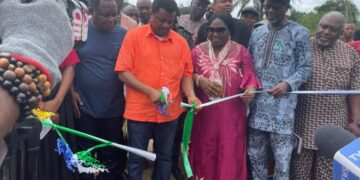The International Fund for Agricultural Development (IFAD) Country Director, Ms. Dede Ahoefa Ekoue, has lauded the Cross River State Office of the Livelihood Improvement Family Enterprise for the Niger Delta (LIFE-ND) for its exemplary leadership and project implementation during a one-day working visit to the state.
Ms. Ekoue, who had earlier participated in the groundbreaking ceremony of the Special Agro-Processing Zone at Adiabo in Calabar, commended the collaborative synergy between the Federal Government, the Niger Delta Development Commission (NDDC), and the Cross River State Government, stressing its importance to the success of the agro-processing hub.
Speaking to journalists, Ms. Ekoue remarked, “The Cross River State Office has made a very laudable impression. They have surpassed the expectations and targets for the project, touching on all value chain commodities. This commendable performance has positioned the state as a beneficiary of additional funding and the second phase of the project.”
A highpoint of her visit was the inspection of the 20-million-capacity fish hatchery at the state office, where she expressed satisfaction with the level of strategic engagement, particularly with incubatees and students from the University of Calabar and the University of Cross River State. She noted that the commitment of the team was vital to ensuring the sustainability of the LIFE-ND project.
The climax of the visit was the commissioning of the IFAD-assisted open market at Urua-Ndung community in Akwa Ikot Effanga Clan, Akpabuyo Local Government Area. The community, which came out in large numbers to welcome the delegation, received high praise from Ms. Ekoue for their grassroots-driven ideas aimed at livelihood enhancement.
“This community has shown that development thrives when people take ownership. The open market initiative is a reflection of the LIFE-ND’s vision of empowering communities to lead their transformation,” she said.
While paying a courtesy call on the Cross River State Commissioner for Agriculture and Irrigation Development, Hon. Johnson Ebokpo, Ms. Ekoue thanked the state for its unwavering support, particularly in counter-funding and logistics, which are crucial for meeting project milestones.
In response, Hon. Ebokpo Jr and the Commissioner for Ministry of International Donor Corporation Mr, H. Lukpata represented by the Permanent Secretary, Bar, Anthony Effiom commended the IFAD team for their consistent support, affirming the state’s commitment to project success. “The Governor has adopted the hatchery as a state-owned project and tasked the Commissioner for Livestock and Aquaculture, Ntufam Emmanuel Anom, with its delivery. We’ve also procured 108 mini-tractors and will work closely with the LIFE-ND state office and local councils,” he said.
The Commissioner also praised the National Project Coordinator, Dr. (Engr.) Sani Abiodun, and the State Project Coordinator, Mr. Innocent Ogbin, for their leadership. He further acknowledged the intervention of USAID in bridging observed gaps, aligning with Governor Otu’s “People First” agenda.
The newly commissioned open market, comprising 14-unit stalls, a solar powered borehole, tank stands, toilet and four 2,000-litre GeePee tanks, was officially handed over to the Akpabuyo Local Government Council, represented by the Secretary, Ms. Juliet Bassey. She assured that the Council would partner with the community to maintain and expand the facility.
Traditional leaders, Chief Offiong Nyong and Chief Bassey Okon, expressed gratitude on behalf of the clan, noting that the new market, which significantly reduces a 10km commute to the nearest trading centre, would alleviate the burden of transportation and other logistical challenges.
Incubatees Josephine Dominic and Bassey Asuquo shared moving testimonies of transformation. “This project has not only taught us poultry and aquaculture skills but has transformed our lives. We now own land, motorbikes, and even vehicles—this is a life-changing experience,” they said.
Dr. Abiodun Sanni, the NPC and Mr. Innocent Ogbin, the SPC, all credited the project’s success to teamwork, strong community ownership, and strategic human capacity development, stating that both the positive and negative long-term impacts were taken into consideration to ensure the LIFE-ND legacy endures.












